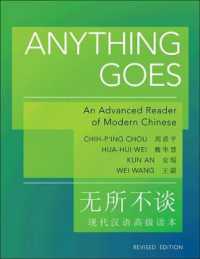- ホーム
- > 洋書
- > 英文書
- > Business / Economics
基本説明
This book uses game-theoretic concepts and models to address the issue of political decision-making processes.
Full Description
Political and economic institutions are typically governed by committees that face the challenge to reconcile the preferences of their members. How should decision rules be designed to generate fair and sustainable agreements, for example if committee members represent groups of different sizes? This book uses game-theoretic concepts and models to address the issue of political decision-making processes. In addition to providing a survey on basic game-theoretic tools in the analysis of political decisions, the author looks at specific issues such as two-tiered voting systems or the influence of lobbyists on legislative committees, and shows how the models can be applied to real-world contexts such as the EU decision-making institutions.
Contents
Games and Political Decisions.- Committees as Representative Institutions.- Robust Equal Representation.- Committees and Lobby Coalition Formation.








